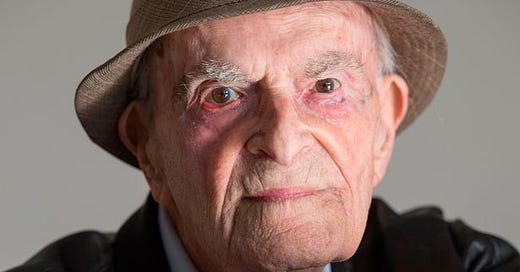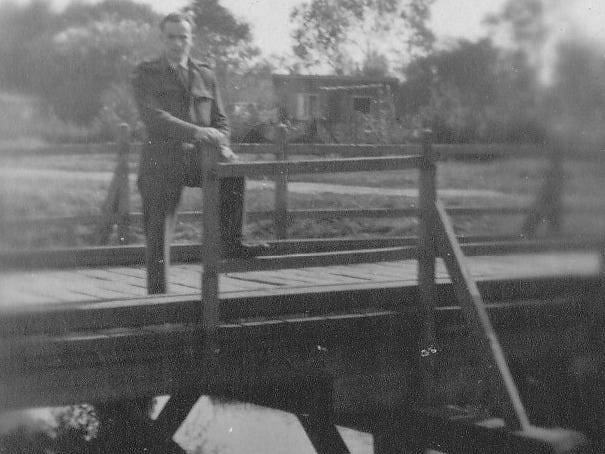"World War Two radically altered, for the better, the political trajectory of my generation."
Harry Leslie Smith spent the last decade of his life writing, speaking and crisscrossing Britain and Canada to warn the public about the dangers of unfettered capitalism for humanity and democracy. He correctly predicted that without a return to socialist politics- fascism and wealth inequality would destroy not just our society but civilisation itself.
His unfinished history The Green & Pleasant Land- is a part of his Harry's Last Stand project. It along with 5 other books written during those last years of his life is an exploration of his generation during the eras before and after the creation of the Welfare State.
For the last year, I have been refining and editing The Green & Pleasant Land to meet my dad’s wishes. Below are more chapter excerpts from it dealing with episodes of his life in the RAF, during 1944. The final chapters are soon to be made available and should you wish a beta copy of the book, send me a DM.
I have also included a tip jar for those, who are so inclined to assist me in this project.
The Green & Pleasant Land Chapter 36 1944
World War Two radically altered the political and economic trajectory of my generation. Before it, early 20th-century capitalism pegged me for one task to be a labourer like my father and grandfathers before me. If Hitler’s lust for world domination had not intervened, my lot was to work six days a week and eke out a living at Grosvenor’s Grocers.
Had the unsteady peace of the 1930s endured, the road ahead for me was marriage at the age of 21, and children to follow soon thereafter. I'd live in a rented one-up-one-down row house that was too cramped, expensive, and grim to enjoy.
If capitalism had not been tamed by post-war socialism, the owners of Britain's economy would have treated my generation with as much contempt as they treated everyone who came before us.
By 1944 no worker whether in uniform or as a tradesperson in a vital service for the war effort was willing to settle for the lives their parents had endured. The war was transforming Britain into a functioning democracy. Peacetime promised economic equality but during the conflict, societal change was already present and accelerated for the better as each day brought us closer towards victory.
1944 was a year of heightened awareness that life was for the living. After four years of conflict, we had learned our lesson. Grab what you can from existence because the war had a nasty habit of snuffing you out before you reached a quarter century of life. Death from the air, death in battle, and death around each and every corner heightened our awareness that existence was a gift easily taken from you. The war broke down our inhibitions politically and also socially. If you might die tomorrow, you better live today and so societal inhibitions eroded.
Young men and women were uprooted from their peacetime lives and norms. They were compelled to leave the towns of their birth and join the military. British women from my generation were similarly uprooted and, if unmarried, became WAAFs, took jobs in munitions factories or became part of The Land Girls Brigades.
The old order of things fell apart, especially when it came to sexual relations. There was now a nonchalance to dating and sex as long as a condom was used. Relationships were ephemeral because there was no surety you'd be alive the following day.
Tenderness, cruelty, kindness, selfishness and affection mixed together when my generation was granted a 24-hour pass from the war.
In peacetime, I'd have never dated Claire because she was posh and came from a class of people who owned their homes and sent their children to university rather than the coalface.
But the war was about making opportunities and breaking boundaries. Claire was a WAAF assigned to serve tea to returning bomber crews and my firefighting unit.
On a night after I helped douse a fire on the runway from a Lancaster that had crash-landed, Claire poured me a cuppa. I made a joke to her that I had memorised from a Marx’s Brother movie, and she broke our laughing.
After that night, we began to run into each other and exchanged pleasant hellos and idle chit-chat.
Claire was pretty, and I liked her because she treated me as her equal, which was unusual for those in the middle class who generally viewed working-class northerners as inferior beasts of burden. I decided to ask Clair out for a drink when I was off duty, but it still surprised me she accepted.
I soon learned Claire was full of surprises. At the pub, she drank beer rather than gin and smoked hand-rolled cigarettes that day labourers were fond of for their inexpensive cost.
Claire declared she was a communist and a member of the Party. It was said in an accent so posh that her revelation of being a communist sounded as respectable as admitting being a congregate in The Church of England. I had met communists before, but they were always rough and ready men from the pits or those trade unionists who had come back from the trenches of Spain's civil war.
My relationship with Claire was brief, like all of my affairs during the war. I wasn't sure if she liked me or was trying to recruit me for the party. Sometimes, it felt I was a "bit of working-class rough" for her. But that had more to do with my lack of self-confidence than her impression of me.
The short time I spent with Claire was profound both intellectually and physically.
She knew about Freud, Brecht, Joyce Virginia Woolf and Emma Goldman. Claire loved Lenin the way the nuns of my youth loved Jesus. It was an unbending devotion which I was incapable of understanding. Poverty had made me a socialist but also a realist. I knew that blind faith in a religion or ideology always guaranteed that a New Jerusalem never got built. She was an idealist and hated her class. But loved her brother who was fighting on the Italian Front. Claire like anyone who is interesting and young was an unformed personality like those islands that are created from a volcano erupted on a sea bed. She was emotional one moment and coldly rational the next. Between puffs on a cigarette, Claire was able to saying something funny and then in the next instance be deadly serious about her politics. Sometimes, I couldn’t keep up because after years of hunger, and being deprived an education, I was only good at creating facades to hide my inadequacies that were created by capitalism.
Our relationship ended as it started on friendly terms. I was posted elsewhere, and youth never looks back, whether in wartime or peacetime. Much later, I learned through a chance encounter with a fellow WAAF who knew her that Claire didn't survive the war. She didn't even die from one of Hitler’s bombs. Instead, it was cancer that got Claire.
During my relationship with Claire, I received disturbing letters from my mother about my sister Alberta’s well-being. She was dissolving under the stress of war. With a husband on the lamb for desertion, she waited for his return like Penelope for Odysseus, except there were no suitors to ward off on Low Moor, only coopers harassing her. In 1944, her son was almost four years old, and my sister was exhausted, anorexic and beaten down like a dog at the age of 24. My mother in one of her letters to me, questioned whether Alberta was able to survive until peace returned. "What will happen to her lad, if she dies?"
I didn't know what would become of Albert’s son if she died. But I did know because it was May 1944 that Britain, America, Canada and France were about to undertake the largest seaborne invasion of Europe and many were soon to die liberating the continent.
Thanks for reading and supporting my Substack. Your support keeps me housed and allows me to preserve the legacy of Harry Leslie Smith. Your subscriptions are so important to my personal survival because like so many others who struggle to keep afloat, my survival is a precarious daily undertaking. The fight to keep going was made worse- thanks to getting cancer along with lung disease and other comorbidities, which makes life more difficult to combat in these cost-of-living, tariff war crisis times. So, if you can, join with a paid subscription, which is just 3.50 a month, or a yearly subscription or a gift subscription. I promise the content is good, relevant and thoughtful. But if you can’t it is all good too because I appreciate we are in the same boat. Take Care, John.





And the message is more urgent than ever. The Plan for the New American Century is a plan for world domination by the "free" market zealots in the US and elsewhere.